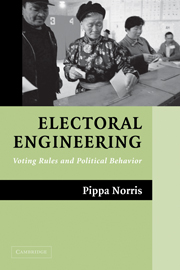Book contents
5 - Social Cleavages
Published online by Cambridge University Press: 05 September 2012
Summary
In the previous chapter I documented how electoral systems have important mechanical effects upon party systems. They can also be expected to exercise an indirect psychological impact upon patterns of electoral behavior as well, including to what extent voting choices are determined by social identities. To explore these matters, in the first section of this chapter 1 outline the framework for understanding these issues by comparing rational-choice institutionalism and cultural modernization theories. In the second section I examine patterns of cleavage politics and the influence of the primary cleavages on voting behavior in the legislative and presidential elections under comparison, including the role of social class and religion. The conclusion considers the extent to which these relationships are contingent upon the incentives provided under different electoral systems and to what degree they are determined by broader secular trends.
Theories of Social Cleavages and Voting Behavior
The seminal sociological studies of voting behavior developed during the 1960s by Seymour Martin Lipset and Stein Rokkan emphasize that social identities formed the basic building blocks of party support in Western Europe. For Lipset and Rokkan, European nation-states were stamped by social divisions established decades earlier, including the regional cleavages of center-periphery, the class inequalities between workers and owners, and the sectarian cleavages over church and state that split Christendom between Catholics and Protestants. These traditional cleavages were powerful for several reasons. First, they reflected major ideological fissures in party politics.
- Type
- Chapter
- Information
- Electoral EngineeringVoting Rules and Political Behavior, pp. 96 - 125Publisher: Cambridge University PressPrint publication year: 2004



